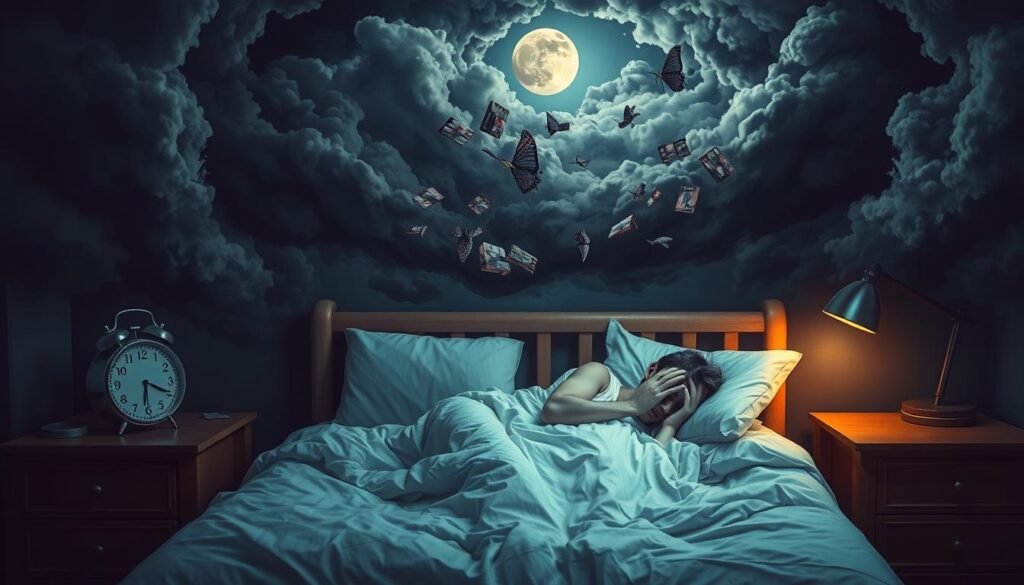Over 60 million Americans struggle with not sleeping well. This affects their mental health. Anxiety and insomnia often happen together, making each other worse. This can lead to serious problems like depression, obesity, and heart disease. In our busy world, finding natural ways to deal with anxiety and sleeping problems is very important. These natural methods are good alternatives to standard treatments that might have bad side effects.
There are many natural options to help you sleep and manage anxiety. Focusing on mental health improves your overall happiness. Using mindfulness or calming scents to relax can make a big difference in how well you sleep and handle stress.
Trying natural remedies such as herbal supplements or deep breathing exercises could help you sleep better.
Key Takeaways
- Natural remedies for anxiety include exercise, meditation, and herbal treatments.
- Proper sleep hygiene can significantly improve sleep quality and combat sleep disorders.
- Recognizing the connection between anxiety and insomnia helps in finding effective solutions.
- Incorporating relaxation techniques can promote restful sleep and reduce anxiety.
- Consulting healthcare professionals is advisable if anxiety or sleep issues persist.
Understanding Anxiety and Insomnia
Anxiety covers a wide range from simple worries to severe anxiety disorders. It disturbs daily life. Knowing anxiety symptoms helps tell it from normal stress. Recent studies show a big link between anxiety and sleep problems, like insomnia. They show how each problem can make the other worse.
Defining Anxiety: When It Becomes a Disorder
Anxiety is how we naturally react to stress. But it turns into a disorder when the worry is constant and overwhelming. Symptoms include too much worry, feeling uneasy, a fast heartbeat, and getting easily annoyed. It can mess with work, friends, and family. Studies show people with anxiety disorders often can’t sleep well. This cycle can hurt one’s mood and health.
The Connection Between Anxiety and Sleep Disorders
Anxiety and insomnia are closely linked. High anxiety makes it hard to sleep well. This bad cycle frustrates many people. Chronic insomnia means you can’t sleep well for months. It can make anxiety worse. During the day, it leads to less focus and more annoyance. Worrying about sleep also makes anxiety worse. It’s key to treat both to feel better.
The Impact of Anxiety on Sleep Quality
Anxiety significantly affects sleep quality, and it doesn’t just impact the mind. About 20% of American adults face this challenge. It affects emotional and physical health. Symptoms from anxiety can disrupt sleep, making it hard to rest well.
Emotional and Physical Health Consequences
Because of anxiety, emotional health can take a hit. Symptoms can include poor focus and mood changes. This can add to stress levels.
Stress makes getting good sleep harder. Anxiety can lead to insomnia, increasing the risk for diseases like heart disease and diabetes. Below, find a table outlining these effects.
| Impact Area | Effects |
|---|---|
| Emotional Health | Poor concentration, mood swings, increased stress |
| Physical Health | Higher risk of chronic diseases, fatigue, daytime sleepiness |
| Sleep Quality | Difficulty falling/staying asleep, disrupted sleep cycles |
How Anxiety Interferes with Sleep Cycles
Anxiety messes with our natural sleep rhythms. It makes falling and staying asleep hard. A lot of people with anxiety, especially those who have faced combat, struggle with insomnia.
Not sleeping enough makes mental health problems worse. This creates a cycle that is hard to break. Cognitive behavioral therapy helps by teaching ways to manage anxiety and sleep better. For better sleep and health, it’s key to deal with anxiety’s root causes.

Natural Remedies for Anxiety
Anxiety impacts more than 19% of U.S. adults yearly, so finding good coping ways is key. Natural remedies offer help without the downsides of drugs. Exercise, herbal treatments, and aromatherapy are especially good choices.
Exercise as a Natural Stress Relief
Working out regularly is a strong way to fight anxiety. High-intensity activities are especially good for easing anxiety symptoms. By staying active, you can cut your risk of anxiety by almost 60% over two decades. Adding relaxation techniques like yoga or tai chi boosts exercise’s calming effects. This shows how vital exercise is for mental health and managing anxiety.
Herbal Remedies and Their Effectiveness
Herbs can calm anxiety without needing a doctor’s note. Chamomile is notable for its ability to adjust cortisol, a major stress hormone. It’s shown to help with anxiety symptoms, especially in those with generalized anxiety disorder. Though not all herbals have strong proof, talking to a health expert can help find what works best for you.
Aromatherapy and Its Benefits
Aromatherapy is another way to ease anxiety. Oils like lavender and bergamot are famous for their calming effects. Smelling these oils can relax you, lower stress, and boost happiness. Using aromatherapy with other methods can really help alleviate anxiety symptoms. These practices stress the need for routines that support mental wellness and relaxation.

For more tips on handling anxiety and getting better sleep, look into effective techniques for a healthy lifestyle.
Techniques for Managing Anxiety
Anxiety often disrupts daily life and sleep. To manage it, try mindfulness meditation and deep breathing. These methods improve emotional and physical well-being. They can lead to better sleep too.
Mindfulness Meditation Practices
Mindfulness meditation helps focus and calm your thoughts. It makes you aware of the present, reducing anxiety. With regular practice, emotional balance and stress reduction improve life quality.
Deep Breathing Exercises for Calmness
Deep breathing can quickly ease anxiety. It balances breathing and slows down your heart rate. By focusing on breaths, it relaxes the mind and body, promoting relaxation when done daily.

To improve sleep, practice good sleep hygiene. Keep a regular sleep schedule, limit caffeine and alcohol, and avoid screens before bed. These habits, along with meditation and breathing exercises, manage anxiety well.
| Technique | Benefits | Recommended Duration |
|---|---|---|
| Mindfulness Meditation | Reduces stress and enhances emotional regulation | 10-30 minutes daily |
| Deep Breathing | Alleviates acute anxiety symptoms | 5-15 minutes as needed |
| Progressive Muscle Relaxation | Eases tension and fosters body awareness | 20-25 minutes, 3-4 times a week |
Trying these techniques can help you handle anxiety, leading to peaceful sleep and a better life. For more on anxiety and sleep, visit this resource.
Understanding Insomnia: Causes and Symptoms
Millions of adults in the United States suffer from insomnia. This sleep disorder makes it hard to fall asleep or stay asleep. It can be triggered by insomnia causes like stress and anxiety. This often leads to feeling sleepy and tired during the day, making things worse.
Identifying Sleep Disorders and Patterns
It’s important to know the symptoms of insomnia for diagnosis and help. Sufferers may face:
- Difficulty falling asleep
- Frequent awakenings throughout the night
- Poor overall sleep quality
- Daytime fatigue and irritability
Recognizing these signs helps in finding out the possible sleep disorders. Insomnia can be short-term or long-term. Short-term or acute insomnia lasts a few weeks. Long-term or chronic insomnia happens most nights for more than three months.
The high numbers of people with insomnia show why we need to tackle its signs and insomnia causes. Aging, stress, and irregular work hours can worsen insomnia. It’s crucial to find the right treatments.
Natural Remedies for Insomnia
Many people tackle insomnia using natural methods. Taking melatonin supplements can help regulate sleep cycles. Adding herbal teas and foods high in tryptophan to your diet also improves sleep.
Melatonin Supplements: How They Work
Melatonin supplements help those with sleep issues. They tell your body it’s time to sleep. Taking them 30 minutes to two hours before bed can make a big difference. People usually take 1 to 5 milligrams. It’s a safe way to fix sleep patterns.
Role of Herbal Teas and Tryptophan-rich Foods
Herbal teas like chamomile and valerian are known for their soothing effects. Chamomile improves sleep quality, particularly in older folks. Valerian root helps with insomnia if taken at bedtime.
Eating foods rich in tryptophan, like turkey, dairy, and bananas, also helps. These foods boost serotonin, making you feel relaxed. Warm milk, high in magnesium, is good before bed too.
Combining melatonin supplements, herbal teas, and the right foods can help anyone beat insomnia. This approach leads to better sleep habits.
Creating a Sleep-friendly Environment
Creating a sleep-friendly environment is crucial for good sleep and health. Good sleep hygiene practices can greatly improve sleep quality. These involve setting up the bedroom for the best rest, making it a place of relaxation and calm.
Importance of Sleep Hygiene
Sleep hygiene is about habits that foster quality sleep. It’s about following a sleep routine and avoiding bright screens before bed. Screens from phones and TVs emit blue light, which makes falling asleep hard. Keeping the bedroom dark, quiet, and cool, around 65 degrees, helps too. Cleaning regularly, like washing sheets every two weeks, also plays a role by keeping away dust mites and allergens that could affect sleep.
Optimal Bedroom Conditions for Rest
Setting up the ideal bedroom is vital for restful sleep. Here’s what’s important:
| Condition | Recommended Level | Impact on Sleep |
|---|---|---|
| Temperature | 65°F (18.3°C) | Promotes deeper sleep stages |
| Light Exposure | Below 10 lux in the evening | Reduces awakenings and improves slow-wave sleep |
| Noise Levels | Quiet, or use white noise machines | Prevents sleep fragmentation |
| Mattress Age | Under 10 years | Affects overall comfort and spine alignment |
| Color of Walls | Soft blues or greens | Creates a calming atmosphere |
Using calming scents, like lavender essential oil, improves sleep quality. A clean and organized sleep area helps you focus on sleeping well. By ensuring these conditions, you can sleep better and boost your overall well-being.
Combining Techniques for Better Sleep
People trying to sleep better can gain a lot by combining techniques for sleep. Using different methods together can really help with insomnia and stress. By adding exercise, mindful activities, and relaxing habits, sleep can improve a lot.
Doing regular exercise can lower stress and help you sleep better. Mindfulness meditation is also great for calming your mind before sleep.
Relaxation exercises can be a perfect addition to your nightly routine. Spending time on these activities before bed helps your body relax. You can find great relaxation tips from credible sources like various relaxation exercises.
For long-term sleep problems, mixing Cognitive Behavioral Therapy for Insomnia (CBT-I) with relaxation methods works well. CBT-I tackles the root causes of insomnia, not just the symptoms. It helps you change your sleep habits and manage anxiety, improving your sleep overall.
Trying out different techniques helps find what works best for you. Whether it’s yoga, keeping a sleep diary, or trying biofeedback, this whole approach makes better sleep more achievable.
Targeting Anxiety and Insomnia Together
Tackling anxiety and insomnia at the same time can make treatments more effective. Approaches treating both conditions together understand how closely they are linked. Studies show that many people with mental health issues also have trouble sleeping.
This especially affects those with anxiety. So, it’s important to focus on both anxiety and sleep problems together.
Integrated Approaches for Relief
Cognitive Behavioral Therapy (CBT) is very effective for both anxiety and insomnia. It helps change the negative thoughts that cause sleep problems. By managing anxiety better, people can sleep better too.
However, insomnia can stay even after anxiety gets better. This means both issues need specific attention. You can read about the link between sleep and anxiety disorders here.
Cognitive Behavioral Therapy for Anxiety and Insomnia
CBT is great for helping those with both anxiety and sleeping problems. It addresses both the stress that causes anxiety and promotes better sleep patterns. This kind of care helps a lot in the long run.
With more people struggling with sleep, especially those with anxiety, learning about CBT’s benefits is key. It’s important for handling these issues well.